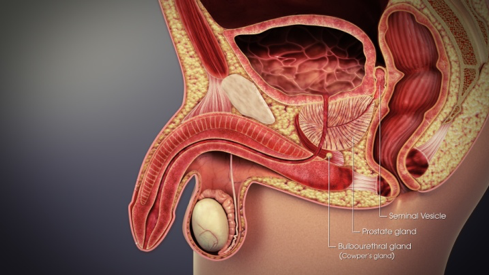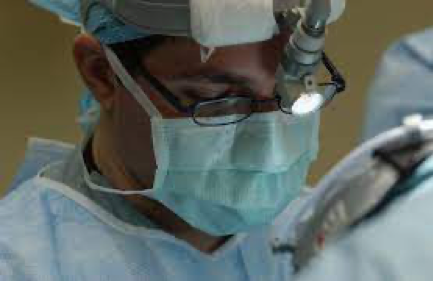This article is about the prostate and prostate cancer. The prostate is a gland present in between the penis and the bladder. It has the urethra running through it and is directly in front of the rectum. It allows the urethra to contract or expand to let the urine pass through. It is normally walnut-shaped and the same size but may change physiologically in case of cancer.

(Source)
Prostate cancer is a prevalent condition among males and is highly treatable during the early stages. This cancer initially begins within the prostate, causing the development and production of abnormal cells. From there on, the cancer cells can spread to the rest of the body and organs like lymph nodes, stomach, etc.
These are the functions that a healthy prostate gland performs:
- Aiding urine control
- Production of the fluid that is necessary to nourish and transport sperm
- Secretion of PSA (prostate-specific antigen), a protein that aids semen maintain its liquid form
Symptoms of Prostate Cancer
Acute Symptoms
Only screening can detect the early stages of prostate cancer and indicate the spread, whereas the symptoms in the early stages remain minimal (unnoticeable). Screening is the standard diagnoses procedure because it measures the levels of PSA in blood.
Symptoms that men with prostate cancer might experience:
- Painful urination
- Blood in urine/semen
- Trouble controlling urination (maintaining and stopping)
- Pain during ejaculation
- Frequent urge to urinate
- Pain while sitting
Chronic Symptoms
Other noticeable symptoms that may occur during the chronic stages:
- Weight loss
- Fatigue (tiredness)
- Back pain
- Bowel habits fluctuations
- Bone fractures
- Bone Pain (thighs, hips, etc.)
- Edema
Stages of Prostate Cancer
Learning the stages of this cancer can help determine the right course of action and know what to expect as symptoms and discomfort. Here are the four main stages of prostate cancer:
- Stage-0: during this stage, the effect is usually limited to a small area where the pre-cancerous cells may be present and growing.
- Stage-1 (Localized): Cancer cells are present in the prostate gland during this stage. This stage is treatable through effective methods.
- Stage-2/3 (Regional): Cancer affects the surrounding tissues.
- Stage-4 (Distant): Cancer cells spread to various parts of the body, affecting organs like lungs and bones.
Causes of Prostate Cancer
Prostate cancer is more likely when changes in the glandular cells occur. The pre-cancerous and cancerous cells present in the prostate gland are usually called PIN (prostatic intraepithelial neoplasia). High-grade cancerous cells are more likely to grow, spread, and make the treatments ineffective to a certain degree in comparison to low-grade cancerous cells.
Here are some of the main risk factors and potential reasons that scientists and doctors believe might be the causes of prostate cancer in males:
- Genetic Factors: inherited genes and features might play a role in the development of cancerous cells in any part of the body, depending on the changes.
- Aging: the increase in age is often associated with various health problems, including prostate cancer.
- Family History: If your family has a history of cancer, you are likely to have higher chances of developing similar conditions as well. However, some cancers, such as lung cancer, are less likely to be genetic.
- Smoking: Smoking causes a long list of health problems, diseases, and disorders, including prostate and other forms of cancers.
Treatment Options for Prostate Cancer
There are multiple treatment options, but they may only help to reduce and suppress the progression of cancerous cells in the body to a certain level. While there isn’t an absolute cure or remedial situation for prostate or any other type of cancer, here’s what doctors might recommend:
Surgery
Surgeries may include performing a prostatectomy. It involves removing the prostate gland using open surgery or laparoscopic treatment.
Radiation Therapy
- Radiation Therapy (Conformal): using beams of radiation, the doctor might target healthy tissues to minimize their risk of catching the cancerous cells.
- Brachytherapy: in this treatment process, the doctor uses radioactive seeds as implants in your prostate to counter the cancerous cells with radiation treatment.

Monitoring
Checking and recording the PSA levels regularly can help doctors suggest suitable plans of action. Moreover, as the cancerous cells usually spread and progress into high-grade slowly, there may be ample opportunities to detect them at early stages through frequent monitoring.
Chronic Stage Prostate Cancer Treatments
Cancer cells do return after remission, which calls for further severe treatment methods. Here’s what the doctors might recommend:
Hormonal Therapy: Regulating the production of androgens, testosterone, and other similar male hormones help counter the progression and growth of cancerous cells in the prostate.
Chemotherapy: This treatment involves injecting chemical solutions to kill the cancer cells that spread and may be present in different parts of the body.
Cryotherapy and high-intensity ultrasound are the latest medical procedures to treat prostate cancer.
The Prostate & Prostate Cancer: Conclusion
If you are suffering from prostate cancer and want to prevent its progression, or for early detection of this disease, you should seek the help of the best urologist.
At Fifth Avenue Urology, we cater to the needs of our patients in the best way. Providing various medical treatments for common urological medical conditions, we can help you deal with prostate cancer. Give us a call at 212-675-3186 to schedule an appointment today.
Reference Links
https://www.mayoclinic.org/diseases-conditions/prostate-cancer/symptoms-causes/syc-20353087
https://www.cancer.org/cancer/prostate-cancer/about/what-is-prostate-cancer.html
https://www.webmd.com/men/prostate-enlargement-bph/what-is-the-prostate
https://www.cancer.gov/types/prostate/understanding-prostate-changes

[…] doctor might suggest surgical procedures to remove the excess prostate tissue causing the enlargement and pressure on the urethra. These […]
[…] it to the size of a walnut or golf ball in most adult men. However, as men continue to age, the prostate could grow as big as an orange, which can affect the other organs in the body. More specifically, […]